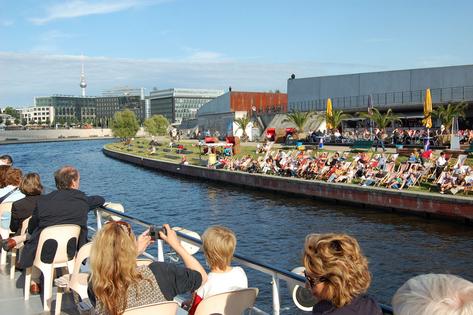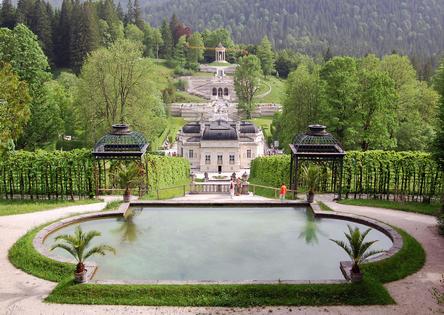Rick Steves' Europe: What's New in Germany and Switzerland for 2010
Published in Rick Steves' Europe
It's been 20 years since the Berlin Wall came down in Germany, and unification seems like old news. From a traveler's point of view, the business at hand seems to be to keep the economy going and visitors entertained. Things are changing in Switzerland as well. Germany's southern neighbor continues to impress me with the creative, constructive, and democratic ways it grapples with various challenges. Here are a few changes you'll encounter in both countries in 2010.
Big things are afoot in ever-changing Berlin. The formerly ugly and foreboding banks of the Spree River are now a delightful people-friendly park, with walks, thriving cafes, fake summer beaches, and glorious architecture. The changes make the once worthless Spree River sightseeing cruises a fine value and one of the best ways to enjoy a restful hour here.
A new super-short U-Bahn line runs between Pariser Platz/Brandenburg Gate and the Hauptbahnhof, with just one stop (at the Reichstag) en route. The stop at Pariser Platz is now called Brandenburger Tor. Previously known as Unter den Linden, it was one of East Berlin's famous unused "ghost" stations. Still, it remains a fascinating time-warp with circa 1950s decor intact.
After being completely rebuilt, the Neues Museum once again houses the Egyptian Museum and the famous bust of Queen Nefertiti. Rebuilding efforts aren't going so smoothly, though, on the other side of the Lustgarten. A public dispute has halted construction at the former site of the Baroque palace of Hohenzollern kings, which was later replaced by the Palace of the Republic, a recently demolished Soviet-style eyesore where the East German parliament met. The plan: Spend 1.2 billion Euros to recreate the Baroque palace facade and put in museums, shops, and concert halls. The reality: Most Berliners (many who wanted to keep the communist-era building for old time's sake) see the project as a waste of money. Right now the site remains an empty lawn -- which many Berliners actually like. What a delightful concept: a big lawn in the middle of a great city.
Those touring Bavaria should check out the Bavarian Palace Department pass, which covers admission to most of Bavaria's castles, including the Residenz and Nymphenburg in Munich, Linderhof, and Neuschwanstein (but not Hohenschwangau). If you're planning to visit at least three covered sites, the 20-Euros pass -- good for a 14-day period -- will likely pay for itself.
Oberammergau's once-a-decade Passion play, an extravaganza starring 2,000 town citizens, will run from May 15 to Oct. 3. (There will be no tours of the theater complex this year.) For the first time, the play will take place in the afternoon and evening, rather than starting in the morning. Unless you're attending the play, it's best to stay away during this busy time.
Several of Germany's museums and churches are undergoing restoration. Wurzburg's glorious Imperial Hall at the Residenz, with its Tiepolo frescoes, is open following a two-year hiatus, though the adjacent and sumptuous Hofkirche Chapel -- the architectural highlight of the city -- will be closed through 2012. At Dresden's Royal Palace, the grand state rooms of Augustus the Strong will remain closed for several years, while the Zwinger Palace's Mathematics-Physics Salon and the Albertinum (with two top-notch art museums) are set to reopen in 2011.
Big things are also happening in Switzerland, where smoking is being phased out of eateries. Laws vary by city and canton (region), not by type of restaurant. So a fine restaurant in uber-traditional Appenzell is more likely to allow smoking than a bar in modern Zurich.
Bern's famous bear pits have closed, and a more politically correct bear park has opened. Since 1857, Bern had been keeping its bears in big, barren, concrete pits. But thanks to the terrorist activity of the B.L.M. -- Bear Liberation Movement -- the city was forced to replace the pits with posher digs. Two new brown bears live there now. In non-bear news, Bern's Historical Museum houses the new Einstein Museum, with exhibits that place this hometown boy's accomplishments in the context of his personal life and historical times.
Elsewhere in Switzerland, Zurich's Swiss National Museum, which focuses on Swiss history, has a huge new wing. In Luzern, the Rosengart Collection now incorporates art from its former Picasso Museum, and the Swiss Transport Museum has a new two-story hall stacked floor to ceiling with 80 vehicles from the past 150 years, including horse carriages, bicycles, and automobiles. Above the Lauterbrunnen Valley, a new via ferrata course (mountain climbing while attached to a steel cable) allows adventure seekers to scramble down from Murren to Gimmelwald with a licensed guide.
Whether clambering the Swiss Alps or exploring the Bavarian countryside, one thing is clear: Both countries are proud of their cultures and are working hard to show visitors why.
========
Rick Steves (www.ricksteves.com) writes European travel guidebooks and hosts travel shows on public television and public radio. E-mail him at rick@ricksteves.com, or write to him c/o P.O. Box 2009, Edmonds, Wash. 98020.
(c)2008 RICK STEVES DISTRIBUTED BY TRIBUNE MEDIA SERVICES, INC.














Comments